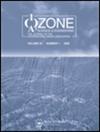Disinfection of Human Amniotic Membrane Using a Hydrodynamic System with Ozonated Water
IF 1.4
4区 环境科学与生态学
Q3 ENGINEERING, ENVIRONMENTAL
引用次数: 0
Abstract
ABSTRACT Human amniotic membrane (hAM) has a great potential in regenerative medicine as it can be disinfected, preserved, and stored. The present study evaluated a hydrodynamic system that uses ozonated water for disinfecting hAM and assessed possible morphological alterations using histological analysis and scanning electron microscopy (SEM). hAM fragments were experimentally contaminated with Staphylococcus aureus (103 CFU/mL) and submitted to disinfection processes for 5, 10 and 15 minutes (1.95, 3.9 and 5.85 mg/cm2 (O3), respectively). The results of the water microbiological analysis showed that no microbial growth was detected in all water samples. The hAM surface monitoring with swab method and the analysis of fragment inoculated directly into the culture media revealed that no microbial growth was detected after 10 and 15 minutes. The SEM and histological analysis of hAM revealed that morphological alterations in the epithelium began after 10 minutes 3.9 mg/cm2 (O3) of the disinfection process, and significant changes in the epithelial cells were observed after 15 minutes (5.85 mg/cm2 (O3)). These findings indicates that the structural integrity of hAM was maintained during the process and suggest that the technique is a promising system to disinfect this biological material.臭氧化水水动力系统对人羊膜的消毒
人羊膜可消毒、保存和储存,在再生医学中具有巨大的潜力。本研究评估了使用臭氧水消毒火腿的水动力系统,并使用组织学分析和扫描电子显微镜(SEM)评估了可能的形态学改变。实验用金黄色葡萄球菌(103cfu /mL)污染火腿碎片,消毒5、10和15分钟(分别为1.95、3.9和5.85 mg/cm2 (O3))。水微生物分析结果表明,所有水样均未检测到微生物生长。用棉签法对hAM表面进行监测,并对直接接种到培养基中的片段进行分析,结果显示,接种10分钟和15分钟后均未检测到微生物生长。扫描电镜和组织学分析显示,消毒10分钟(3.9 mg/cm2 (O3))后,上皮细胞开始发生形态学改变,消毒15分钟(5.85 mg/cm2 (O3))后,上皮细胞发生显著变化。这些发现表明,在此过程中,火腿的结构完整性得到了保持,这表明该技术是一种很有前途的消毒系统。
本文章由计算机程序翻译,如有差异,请以英文原文为准。
求助全文
约1分钟内获得全文
求助全文
来源期刊

Ozone: Science & Engineering
环境科学-工程:环境
CiteScore
5.90
自引率
11.10%
发文量
40
审稿时长
2 months
期刊介绍:
The only journal in the world that focuses on the technologies of ozone and related oxidation technologies, Ozone: Science and Engineering brings you quality original research, review papers, research notes, and case histories in each issue. Get the most up-to date results of basic, applied, and engineered research including:
-Ozone generation and contacting-
Treatment of drinking water-
Analysis of ozone in gases and liquids-
Treatment of wastewater and hazardous waste-
Advanced oxidation processes-
Treatment of emerging contaminants-
Agri-Food applications-
Process control of ozone systems-
New applications for ozone (e.g. laundry applications, semiconductor applications)-
Chemical synthesis.
All submitted manuscripts are subject to initial appraisal by the Editor, and, if found suitable for further consideration, to peer review by independent, anonymous expert referees.
 求助内容:
求助内容: 应助结果提醒方式:
应助结果提醒方式:


